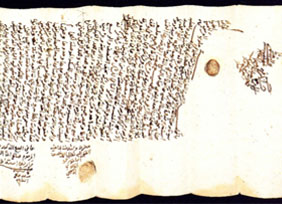Winter Academy 2016: Manuscript Cultures in Exchange, Coexistence and Isolation
Supervised by: Prof. Dr. Raoul Motika and Janina Karolewski, MA
Event date: 22–26 Feb. 2016
Main collaborator: SFB 950 Manuscript Cultures in Asia, Africa and Europe, Universität Hamburg
From 22–26 Feb. 2016, the Orient-Institut Istanbul organized together with the Centre for the Study of Manuscript Cultures (CSMC) of the Universität Hamburg and in cooperation with the Islamic Manuscript Association (TIMA) in Istanbul the Winter Academy “Manuscript Cultures in Exchange, Coexistence, and Isolation.”
The Winter Academy aimed to put a spotlight on the research being done at the CSMC in Turkey and to establish initial contacts between Hamburg and Turkish researchers. In addition, the Winter Academy allowed the Hamburg scholars to become acquainted with the rich archives and libraries of Istanbul. In the morning, the participants of the Winter Academy visited various manuscript-relevant institutions in Istanbul, including the Archaeological Museum with its abundant collection of cuneiform tablets, the department of book restoration and archiving of the Committee of the Manuscript Society of Turkey, the Sakıp Sabancı Museum, the Research Center for Islamic History, Art and Culture (IRCICA), the Ottoman central archive of the General Directorate of State Archives of the Prime Ministry of the Republic of Turkey, the manuscript collection of Istanbul University, and the Museum of Turkish and Islamic Arts.
Four afternoon workshops were held on the following topics: (1) A Forgotten Galaxy Still Persisting? Manuscript Cultures in Asia, Africa and Europe, (2) Historical Manuscripts under Scrutiny: Computer Based Tools and Material Analysis, (3) Manuscripts and Politics of Memory, and (4) “Manuscript Cultures in Interaction.” The accompanying program of the Winter Academy included two evening lectures at the Orient-Institut Istanbul. Michael Friedrich, spokesperson for the CSMC, presented new approaches and problems in current manuscript research and Ralf Martin Jäger (Universität Münster) introduced the research project under his direction, “Corpus Musicae Ottomanicae” on Near Eastern music manuscripts.
Workshop: Manuscript Cultures of the Ottoman Empire
Supervised by: Aslıhan Gürbüzel, MA (fellow), Dr. Richard Wittmann, and Prof. Dr. Raoul Motika
Event date: 6–7 June 2012
Main collaborator: History Department at the University of California & SFB 950 Manuscript Cultures in Asia, Africa and Europe, Universität Hamburg
The international workshop was conducted in cooperation with the History Department at the University of California Los Angeles (UCLA) and the Centre for the Study of Manuscript Cultures (SFB 950) at the Universität Hamburg. All ten presentations dealt with a wide array of topics ranging from book and library culture among the Ottomans to writing culture and individual manuscripts. The involvement of primarily young academics from the US, Turkey, and Germany was a first step toward establishing a network for exploring Ottoman manuscript culture. The high quality of the contributions, which were mostly based on current doctoral research, and the well-informed discussions point in particular to the growing interest in manuscript research. It is also worth noting that the event took place largely due to the initiative of a fellow of the OII and doctoral student at Harvard University. With the Institute’s help, after her to stay in Istanbul, she was also able to go to Hamburg on a grant from the SFB Manuscript Cultures to gain insights into comparative manuscript research.

